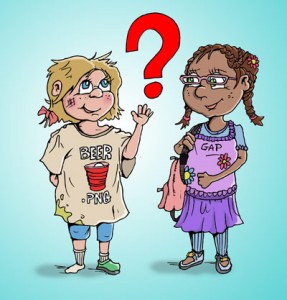What to do when your child brings home the poor kid.

From Chapter 15
‘Outings with the friend’
Editors Note: The following is an excerpt from the New york times bestseller ‘What to do if your child brings home the poor kid’ by Gloria H.G Hammond
Published by Fun Sizedâ„¢ Publishing Press paper books, Portland, Oregon © 2013   ÂAs discussed thoroughly last chapter, there are many reasonable ways of avoiding the responsibility and confusion of taking both your child, and their disadvantaged friend with you on your daily errands (My favorite being the “broken” booster seat). If these fail you, don’t panic! If handled correctly, your outing can actually be entirely survivable.
First off, in a retail environment there are many situations that will arise that bring attention to the fact that your kid’s new friend probably doesn’t get whatever they ask for on a daily basis. Knowing this from the get go will be invaluable in making sure your own offspring does not question their notion of entitlement and bring up awkward conversations about the value of money and inequality.
Your kid’s friend will no doubt meander through the store as they would with their own parents, with their hands at their sides, assuming there’s only one day a year they could ever expect to obtain a toy or a pair of new shoes. This will arise suspicion almost immediately within the ignorantly privileged consciousness of your child, so don’t let it ruin the day!  I have a treasure trove of great ideas to sidetrack the curious minds from drifting to a meaningful discussion about class in America, but a few of my favorites are:
♦ Just say “Everything in the store is free today” -This neutralizes any discussion about the value of commodities, and leaves your child’s innocent mind free of any grounding truths.
♦ SEPARATE! -In some cases, you might have your spouse or significant other with you, and its possible to divert the disadvantaged friend from your own child temporarily and let your kid fulfill every usual request and desire out of view.
♦ “Return Policy” – While in the store just purchase multiples of every toy for your child, and their friend. Both children are disillusioned long enough to not ask any questions for the day, and then simply return the second set of toys after dropping of the friend at home and politely explaining the situation to the underprivileged kid, just out of earshot of your child.
There are many, many more ideas out there, but these will get you started. Besides the complications arising from all the stuff you are seen buying for your child to maintain the status quo, one of the things you will need to master is changing the tides of their conversations. Its amazing how quickly the poor children will proudly slip in that their grandparents bought them a jump rope for Christmas, or the casual admission they are not familiar with popular brands like Barbieâ„¢ and/or power wheelsâ„¢.  These things normally might inspire a “huh”, “what” or “why” from your possession laden offspring, but if you are quick to act with several bags of fruit snacks, or a jar of peanut butter for them to share it will buy you some time to rework the conversation in your favor.
I do have to mention one thing that happens to come up allot in my experience, and that is the inevitable question from the friend to your naive spoiled child “Is it your birthday?”. This must be answered with a “Yes” to avoid suspicion, but wait! You must be prepared with cake to complete the rouse, and it is always a safe bet to keep one in your car or purse just in case.
Above all, the most important thing to remember is, Don’t change up your routine! Kids are smart, and they will sense if we are unreasonably depriving them of normality to accommodate their less fortunate friend. If you read through this entire book, with a little luck your child will be tucked in bed at night, knowing in their head that EVERY little boy and little girl gets whatever they want, no matter what.
Â
Â

Leave a Reply
Want to join the discussion?Feel free to contribute!